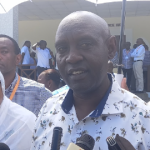Daniel Kiptoo, Director General of the Energy and Petroleum Regulatory Authority (EPRA), has been elected chairman of the 13-member steering committee of the Regulatory Energy Transition Accelerator (RETA) until 2026, when the next elections will take place.
The committee collaborates directly with energy regulators to promote knowledge sharing on regulatory matters essential for accelerating the transition to clean energy.
Kiptoo expressed his appreciation for the position, emphasizing the importance of advancing clean energy capabilities, including geothermal energy exploration, battery energy storage systems, and promoting the nationwide adoption of electric mobility.
“EPRA is committed to leading the adoption of renewable energy from generation to end-use in Kenya. Through RETA, we can collectively share knowledge and resources to expedite the clean energy transition for a sustainable future for all,” he stated.
RETA, which currently includes 54 regulators, was launched during the 2021 United Nations Climate Change Conference by the World Bank, energy innovation officials, and regulators from around the globe as part of the Green Grids Initiative. This initiative aims to accelerate the development of the new infrastructure required for a world powered by renewable energy.
In addition to EPRA, other members include Cameroon’s Electricity Sector Regulatory Agency (ARSEL), Costa Rica’s ARESEP, France’s CRE, North Macedonia’s ERC, Thailand’s ERC, St. Lucia’s NURC, Ontario, Canada’s OEB, and the UK’s Ofge. Permanent members include the World Bank, the International Renewable Energy Agency, and the International Energy Agency.
Kenya has made significant investments in its transition to renewable energy, with the latest data from the Economic Survey 2024 indicating that renewable sources accounted for 89.6% of local electricity production in 2023. Geothermal generation remained the primary source, contributing 48.2% of the total electricity generated locally.
Hydro generation at 21.3 per cent, and wind generation at 16.1 per cent followed this.
Ember’s fifth Global Energy Review Report shows that Kenya is ahead of the global average of 13 per cent.
Kenya is among African countries that are leveraging on renewable energy adoption, only ranking behind Senegal and Morocco.
“Some major economies in the region (Africa) are far ahead of the global average of 13%, including Kenya, Senegal, and Morocco with each generate around a fifth (20%) of their electricity from solar and wind,” the report read in part.
The government aims to achieve a 100 percent clean energy transition by 2030.



